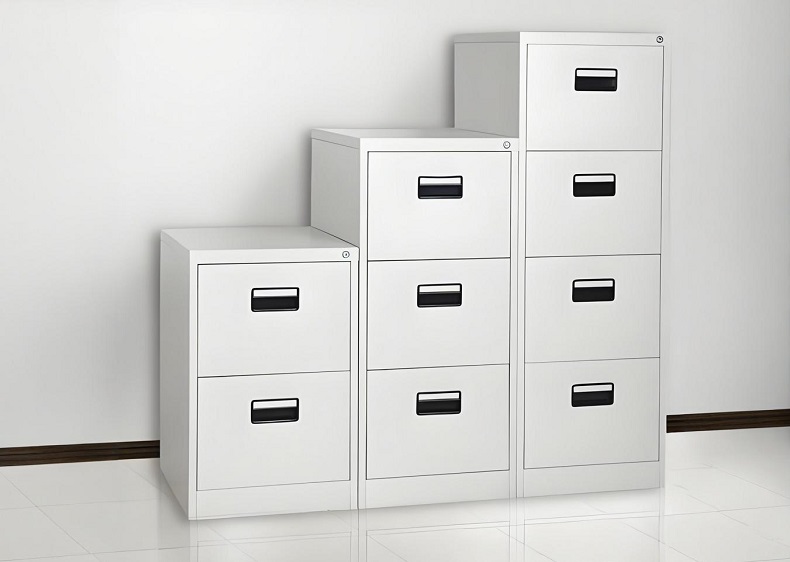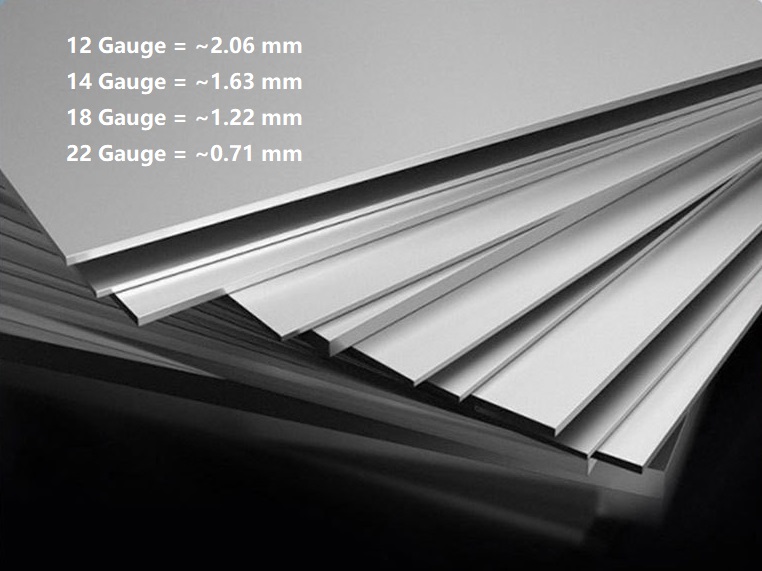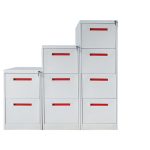
Are you shopping for a new steel file cabinet and feeling confused by terms like "20-gauge steel" or "18-gauge steel"? You're not alone. Many buyers wonder what these numbers really mean and how they impact the quality and durability of their file cabinet. Understanding steel gauge is crucial to making an informed decision and avoiding a flimsy cabinet that dents easily or won't stand up to daily office use. This definitive guide will explain everything you need to know about steel gauge thickness, so you can choose the perfect file cabinet with confidence.
What is Steel Gauge? (And Why The Number is BACKWARDS)
Steel gauge is a traditional measurement system that specifies the thickness of sheet metal. The system originated in the British steel industry and has become the standard measurement for metal products worldwide, including file cabinets.
Here's the most important thing to remember: the lower the gauge number, the thicker and stronger the steel. This counterintuitive system often confuses first-time buyers who assume higher numbers mean thicker material.
Think of it like shotgun shells: a 12-gauge shotgun has a larger barrel diameter than a 20-gauge shotgun. The same principle applies to steel - lower numbers indicate thicker material.
This table shows how gauge numbers correspond to actual thickness measurements:
| Steel Gauge | Thickness (Inches) | Thickness (Millimeters) | Common Use Case |
|---|---|---|---|
| 16-Gauge | ~0.060" | ~1.52 mm | Heavy-Duty, Commercial |
| 18-Gauge | ~0.048" | ~1.22 mm | Standard Duty, Office |
| 20-Gauge | ~0.036" | ~0.91 mm | Light-Duty, Home Office |
| 22-Gauge | ~0.030" | ~0.76 mm | Economy, Light Storage |
| 24-Gauge | ~0.024" | ~0.61 mm | Very Lightweight |
Why Steel Gauge Matters for Steel File Cabinet
The thickness of steel in your file cabinet significantly impacts its performance, durability, and lifespan. Here's why gauge matters:
Durability and Dent Resistance
Thicker steel (lower gauge) better resists dents, scratches, and damage from daily office abuse. A cabinet made with 18-gauge steel will maintain its appearance for years, while a 22-gauge cabinet might show dents from casual bumps or moving equipment.
Structural Integrity
File cabinets hold substantial weight - a fully loaded drawer can contain over 75 pounds of paper. Thicker steel prevents the cabinet from twisting or warping under this weight, especially important for lateral files with wider drawers that require additional support to prevent sagging.
Security
A thicker steel cabinet is heavier and more difficult to move or steal, providing better physical security for your important documents. Additionally, fire-rated file cabinets require specific steel thicknesses to maintain their fire protection integrity and certifications.
Longevity
Heavier-gauge steel cabinets simply last longer. They can withstand years of opening and closing drawers, moving around the office, and supporting heavy loads without failing. This makes them a better long-term investment despite the higher initial cost.

What Gauge Should You Look For? A Buyer's Guide
Choosing the right steel gauge depends on your specific usage needs and environment:
Commercial/Heavy-Duty Use (Recommended: 16-gauge)
For environments that demand maximum durability - such as busy offices, hospitals, schools, or industrial settings - 16-gauge steel is the premium choice. These cabinets can withstand high-frequency use, heavy loads, and the inevitable bumps and impacts of busy workplaces. While they represent a significant investment, their extended lifespan makes them cost-effective for intensive use.
General Office/Standard Duty (Recommended: 18-gauge)
For most office environments, 18-gauge steel offers the perfect balance of strength, durability, and value. These cabinets provide excellent resistance to daily wear and tear while remaining reasonably priced. They can easily handle the weight of fully loaded drawers and will serve reliably for many years in typical office settings.
Home Office/Light Use (Minimum: 20-gauge)
If you have light usage needs and are budget-conscious, 20-gauge steel might be sufficient for home office use. However, we generally recommend upgrading to 18-gauge if possible, as the additional cost is minimal compared to the significant increase in durability and lifespan.
What to Avoid
Steer clear of 22-gauge or higher (24-gauge) steel for any regular filing use. These thin materials feel flimsy, dent easily, and often have shorter lifespans. They may seem like a bargain initially, but they typically need replacement much sooner than thicker alternatives.
Beyond Gauge: Other Factors That Affect Durability
While steel gauge is crucial, it's not the only factor that determines cabinet quality:
Construction Quality
Examine how the cabinet is assembled. Look for reinforced corners, spot welding at stress points, and sturdy construction methods. Well-built cabinets with reinforced frames can sometimes outperform heavier-gauge but poorly constructed alternatives.
Suspension System
The drawer slides and suspension system are equally important as the steel thickness. Quality cabinets feature full-extension ball-bearing slides that operate smoothly even when fully loaded. Test the drawer operation - they should open and close smoothly without wobbling or sticking.
Finish and Coating
A high-quality finish protects against rust and wear. Powder coating is superior to traditional paint as it creates a more durable, scratch-resistant surface that maintains its appearance longer. Look for evenly applied finishes with no thin spots or drips.
Brand Reputation and Warranty
Established brands with good reputations typically maintain higher quality standards and stand behind their products with better warranties. A strong warranty can indicate the manufacturer's confidence in their product's durability.
Frequently Asked Questions (FAQ)
Q: Is 18 or 20 gauge steel better for a file cabinet?
A: 18-gauge steel is thicker and more durable than 20-gauge, making it the better choice for office environments. While 20-gauge might be adequate for very light home use, 18-gauge provides significantly better longevity and dent resistance.
Q: What is the best gauge for a legal or lateral file cabinet?
A: Lateral file cabinets, with their wider drawers, require additional structural support. For these applications, we strongly recommend 18-gauge or even 16-gauge steel to prevent drawer sagging and maintain proper operation over time.
Q: What gauge are typical residential file cabinets?
A: Many residential-grade file cabinets use 20-gauge or 22-gauge steel to reduce costs. However, for home offices with regular use, upgrading to 18-gauge provides much better value and durability in the long run.
Q: Can I tell the gauge just by looking at a file cabinet?
A: While experienced buyers can often estimate gauge by weight and rigidity, the most reliable method is to check the manufacturer's specifications. Reputable manufacturers clearly state the steel gauge in their product descriptions.
Q: Does thicker steel always mean a better file cabinet?
A: While thicker steel generally indicates better quality, it's not the only factor. Construction quality, drawer mechanisms, and finish all contribute to the overall durability and functionality of the cabinet.
Conclusion
Understanding steel gauge is essential when selecting a file cabinet that will meet your needs and last for years. Remember the golden rule: lower gauge numbers mean thicker, stronger steel. For most users, an 18-gauge steel file cabinet represents the sweet spot of durability, functionality, and value.





